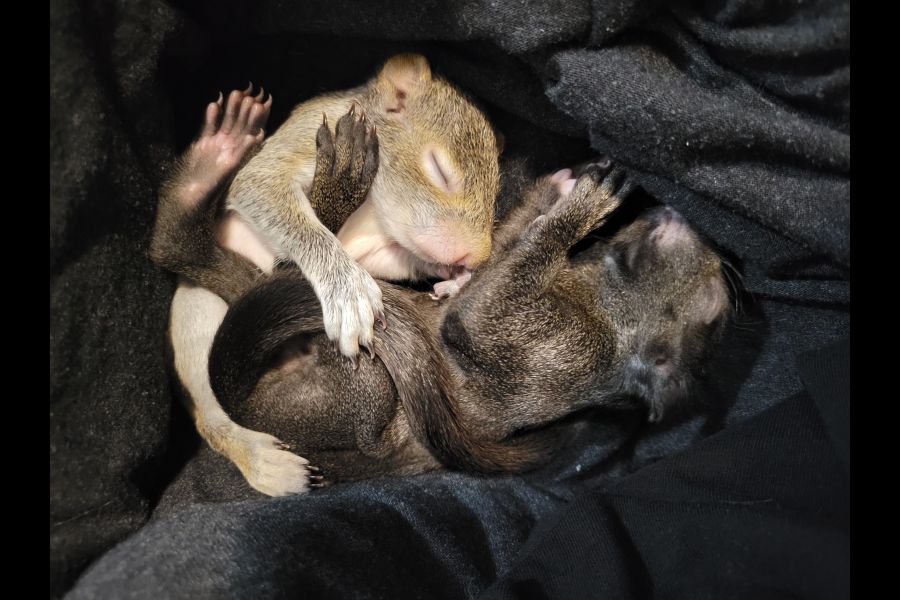Over the weekend, my partner and I had the unfortunate experience of watching a mother squirrel be separated from her two babies after a piece of a roof was removed from our neighbour's home.
While the neighbours aren't to blame, as the squirrels were nesting essentially in their attic, when the piece was removed, the workers discovered the two baby squirrels — one grey, one black.
They tried to put them in a box, which the mother squirrel did initially find, but due to ongoing sounds of large machinery seemed to have left. The babies stayed in the box overnight and we hoped the mom would come back for them.
Unfortunately, the next morning the mother had not returned. To make matters worse, it had rained and the squirrels — about three weeks old, eyes not even opened yet — were wet and cold.
My partner having a giant heart was distressed and immediately brought them inside to warm up. She picked the fleas off of them, sent me rushing out to buy some Pedialyte — she checked and found it is the best way to rehydrate baby squirrels — and we spent our day trying to save the squirrels and reunite them with their mother.
Once we had the squirrels dried off and on a heating pad and on their way to being rehydrated, we decided to see if mama would come back. We waited outside, placed the box of babies near where the nest had been (albeit on the ground, much lower) and we waited. We even played baby squirrel cries on our phones hoping the mum would hear it.
And while the mother did end up coming back to the spot on the neighbour's roof where the nest had been, she unfortunately didn't see the box with the babies. After hours of watching and waiting (we had to keep an eye out, in case neighbourhood cats or dogs got curious) and a phone call to the humane society, we decided the mother was unlikely to return.
Then it started raining again. Everything we could find on the situation told us we should bring them inside, as they can't produce their own heat.
Not wanting to bring the squirrels to the humane society — which didn't have the ability to rehab them — we started looking for places we might be able to bring them.
Should we keep them and try to rehab them until they can be released into the wild? While we very much liked the squirrels, we knew it wasn't the right thing to do. We have a cat, and the danger of being eaten at home aside, squirrels need a natural fear of cats and people. If we'd raised them, it's likely they'd have been a bit too domesticated to survive in the wild.
And, of course, keeping native wild species as pets is illegal. So that was off the table.
It turned out my partner found a rehab centre in Grimsby called Grimsby Urban Wildlife Care, which raises hundreds of abandoned squirrels and re-introduces them into the environment where they were found when they're ready.
A perfect solution — the squirrels would be cared for by experts, and when they were old enough, they'd return to our street.
Overall, it was sad to see a mother and her babies separated. It was hard for my partner to shake that. But we feel we did the right thing for them.
So, what should you do if you find squirrels? First, leave them be. There's a chance the mother will come back for them. If they're still around for four hours or more (or in immediate danger) then put them in a warm box and try to rehydrate them. Do not feed them before rehydrating them, as it could kill them.
After that, bring them to someone who is trained to rehab squirrels. There's a lot to it, from helping them relieve themselves, which they can't do themselves, to the right mix of formula to feed them. The experts know best.
And if you're really interested in helping animals in similar situations, consider making a donation to Grimsby Urban Wildlife Care. These shelters, though they are registered with the Ministry of Natural Resources, do not receive funding by the government and rely solely on donations and fundraising efforts to survive.
The centre spends hundreds of dollars every week in food alone and the woman who runs the shelter works a second job just to pay for it.
The organization can use your help. Donations can be made at www.urbanwildlifecare.com/donate.











